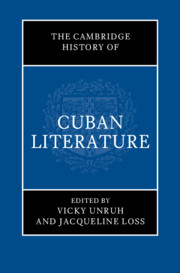Book contents
- The Cambridge History of Cuban Literature
- The Cambridge History of Cuban Literature
- Copyright page
- Dedication
- Contents
- Figures
- Contributors
- Acknowledgments
- Introduction Unfinished Histories
- Part I Literature in the Early Colony
- 1 Silvestre de Balboa’s Espejo de paciencia and the Unfinished Foundational Story of Cuban Literature
- 2 José Martín Félix de Arrate’s Enlightenment Discourse of Cuban Exceptionalism
- Part II Cuban Literature’s Long Nineteenth Century
- Part III Literary and Intellectual Culture in the Twentieth-Century Republic
- Part IV The Revolution’s Literary-Cultural Initiatives and Their Early Discontents
- Part V Cuba and Its Diasporas into the New Millennium
- Epilogue
- Select Bibliography
- Index
- References
2 - José Martín Félix de Arrate’s Enlightenment Discourse of Cuban Exceptionalism
from Part I - Literature in the Early Colony
Published online by Cambridge University Press: 31 August 2024
- The Cambridge History of Cuban Literature
- The Cambridge History of Cuban Literature
- Copyright page
- Dedication
- Contents
- Figures
- Contributors
- Acknowledgments
- Introduction Unfinished Histories
- Part I Literature in the Early Colony
- 1 Silvestre de Balboa’s Espejo de paciencia and the Unfinished Foundational Story of Cuban Literature
- 2 José Martín Félix de Arrate’s Enlightenment Discourse of Cuban Exceptionalism
- Part II Cuban Literature’s Long Nineteenth Century
- Part III Literary and Intellectual Culture in the Twentieth-Century Republic
- Part IV The Revolution’s Literary-Cultural Initiatives and Their Early Discontents
- Part V Cuba and Its Diasporas into the New Millennium
- Epilogue
- Select Bibliography
- Index
- References
Summary
This chapter analyzes the work of Havana-born José Martín Félix de Arrate, often regarded as Cuba’s first historian and deemed the most representative Enlightenment writer of the island’s emergent criollo elite. The chapter focuses particularly on Arrate’s Llave del Nuevo Mundo, antemural de las Indias Occidentales: La Habana descripta (1761), a detailed historical account of Havana as the “key” to the entire New World and its antemural, or rampart. Grounded in in an emergent Cuban consciousness nurtured in exceptionalism, the chapter argues, Arrate showcased the island’s military value; the commercial and economic potential of its environmental and geographical attributes, natural resources, and excellent ports; and the emergent cultural prestige of Havana as a site of reason, while also connoting a race-based hierarchy, typical of the Enlightenment era, of the island’s human potential for labor and defense.
Keywords
- Type
- Chapter
- Information
- The Cambridge History of Cuban Literature , pp. 52 - 64Publisher: Cambridge University PressPrint publication year: 2024

